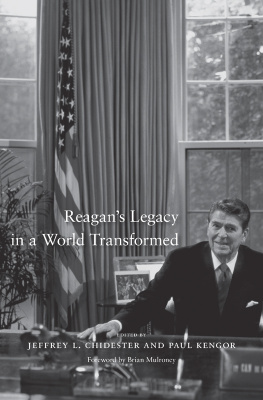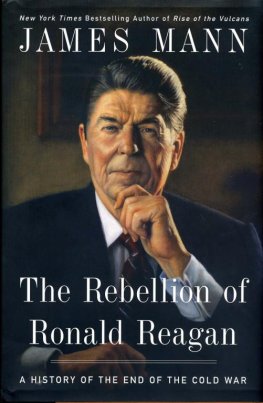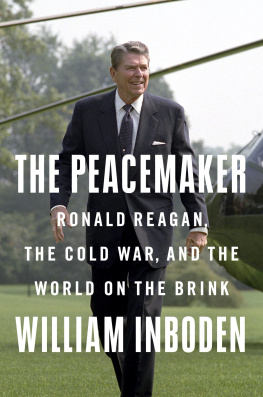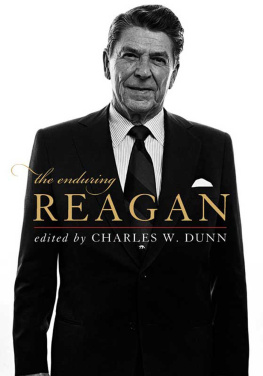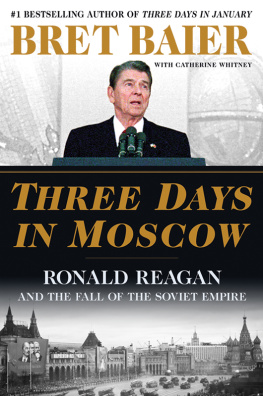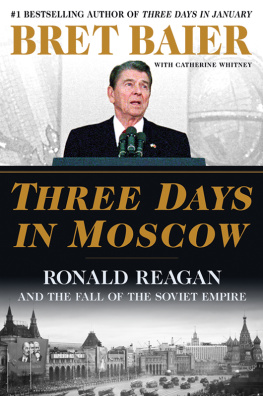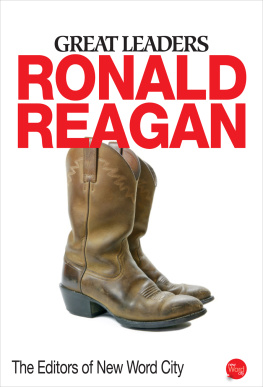Copyright 2015 by the President and Fellows of Harvard College
All rights reserved
Cover photo courtesy of the Library of Congress
Cover design: Tim Jones
978-0-674-96769-4 (alk. paper)
978-0-674-42622-1 (EPUB)
978-0-674-42621-4 (MOBI)
The Library of Congress has cataloged the printed edition as follows:
Reagans legacy in a world transformed / edited by Jeffrey L. Chidester and Paul Kengor.
pages cm
Includes bibliographical references and index.
1. United StatesForeign relations19811989. 2. United StatesForeign relations1989 3. Reagan, RonaldInfluence. I. Chidester, Jeffrey L., editor, author. II. Kengor, Paul, 1966 editor, author.
E876.R423 2015
973.927092dc23 2014035126
BRIAN MULRONEY
Reagans Legacy in a World Transformed is all about remembering Ronald Reagan, his presidency, and the manner in which he changed the world.
During his centennial year in 2011, individuals of great distinction the world over shared their personal reflections of the fortieth American president and bore witness to his lifes work. Many knew Ronald Reagan longer and better than I did. Some worked with him daily for years. I knew him as a fellow G-7 leader with whom I shared moments of high drama on the world stage during one of the most explosive decades in modern history. We became friends, and I saw him often when questions of world peace or war were being determined. In that most scalding of political cauldrons, I observed Ronald Reagan closely. That is the perspective I bring with me to open this volume.
Some years ago the legendary New York Times columnist Scotty Reston came to lunch with me at 24 Sussex, the prime ministers official residence in Ottawa. After an impressive tour dhorizon, Mr. Reston said: You know, Prime Minister, for the last 25 years I have opposed every single policy that your friend Ronald Reagan has ever stood for. Then he added: And during that same period, Ronald Reagan was twice elected governor of California and twice elected president of the United States.
This self-deprecatory observationI thought memorable because of its infrequency at the New York Timeswas delivered somewhat ruefully, as if Mr. Reston were perplexed by his own admission. But to so wise an observer as Reston, the answer surely should have been very clear. Its called leadershipthat ineffable and sometimes magical quality that sets some men and women apart so that millions will follow them as they conjure up new visions and invite their countrymen to dream big and exciting dreams.
In his seminal work on leadership, James MacGregor Burns segregates transactional from transforming leadership. He writes that it is the transforming leader who raised the level of human conduct of both leader and led who responds to fundamental hopes and expectations and who may transcend and even seek to reconstruct the political system rather than simply operate within it. Many suggest that great, inexorable currents of history themselvesand not individual leadersseal our fate. In my judgment, however, Carlyle was on target when he observed that the right man in the right place at the right time can completely change the course of history. I believe that to be true because I was there to see it happen.
In a brilliant address delivered some years ago in Canada, Theodore Sorensonhimself a skilled observer of powerful leaderssaid:
Once in office those who wish to stand up and stand out and leave something enduring behind must build new institutions, not new images. They must look to the next generation, not merely the next election. They must talk in terms of fundamental values, not merely costs. They must appeal to our hopes as well as our needs, to what we long to be and what we know is right. Thats leadership.
Does this remind you of anybody?
Now, if today you asked the American people if they think Ronald Reagan was a transforming president or simply a transactional one, what do you think they would reply? Look around you, they would say, the Reagan Revolution and its powerful effects on freedom, economic prosperity, the private sector, and the public good are clearly visible both to contemporary America and to history.
President Reagans personal qualities defined his presidency in interesting ways. One day at lunch in Tokyo during a discussion of leading personalities in public life, I asked him who he really disliked in American politics. He thought for a moment, looked at me quizzically, and said: You know, Brian, I just cant think of one at the moment. Im fixated on what looks like an eel in my soup. This was a very disconcerting answer for any Canadian prime minister who, on his best days, has more adversaries than friendsand who can clearly remember every insult or slight from any opponent since his fourteenth birthday. In fact, in some countries such generous detachment of attitude in politics would probably be unconstitutional. Nevertheless, under my insistent interrogation, President Reagan finally identified a former associate as someone he actually disliked. This display of vindictiveness on his part made me feel better and partially restored my faith in the American political process.
To be fully serious, however, I noted that because of this absence of malice, President Reagans judgments were unaffected by the pettiness and mean-spiritedness that tend to make good intentions bad and tough situations worse. He never sought to get even with anybody except by the triumph of his ideas. He struck me as a leader more interested in healing old wounds than in settling old scores. In consequence, his true nature and sunny personality came through to the American people, who reveled in the choice of a president who clearly made policy not for easy headlines in 10 days but a better America in 10 years.
I also thought that President Reagans understanding of the nobility of the presidency coincided with the American dream. One day in Brussels following a NATO meeting, President Franois Mitterrand of France, in referring to Ronald Reagan, said to me: Tu sais, Brian, notre ami Ronald Reagan a vraiment la notion de ltat. Rough translation: You know, Brian, our friend Ronald Reagan really has a sense of the State about him. The translation does not fully capture the profundity of the observation: what Mitterrand meant was that there is a vast difference between the job of president and the role of president.
In fact, many people can do the job. Few, however, fully grasp that unusual alchemy of history, tradition, achievement, personal conduct, and national pride that define the special role the U.S. president must assume at home and around the world. La notion de ltatno one understood it better than Ronald Reagan, and no one could more eloquently summon his nation to high purpose or bring forth the majesty of the presidency and make it glow better than the man who saw his country as a shining city on a hill.

